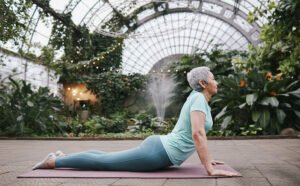Women may struggle to prioritize healthy habits due to multiple responsibilities; however, even making small, simple changes can have a significant positive effect on overall health and well-being.
Exercise helps control weight, lower blood pressure and decrease risk for heart disease. Furthermore, regular physical activity supports healthy sleeping patterns as well as bettering mental wellbeing.
1. Eat a Healthy Diet
Eating healthily is one of the most essential habits you can establish. Achieve this means eating foods from all five major food groups (fruits, vegetables, grains, dairy and proteins) at appropriate portions for you and your stage in life.
Make sure that your diet includes a variety of food, and that you try new things on a regular basis. This could involve anything from adding an extra serving of your usual vegetable to cooking with an unfamiliar ingredient; to taking the stairs instead of an elevator; walking to work or lunch; dancing; stretching daily etc.
Try to balance protein and carbs at each meal and snack to help feel full for longer, especially as estrogen drops with menopause. Eating foods rich in proteins such as meat, fish, tofu, tempeh nuts or seeds may also ease hot flashes. Incorporating them can help prevent hot flashes while protecting sleep quality? avoiding screens 30-60 minutes before bed is recommended for optimal mental and physical wellness!
2. Exercise Daily
Women must establish a daily exercise regime in order to stay in good health. Exercise increases high-density lipoprotein (HDL) cholesterol and decreases unhealthy triglycerides, helping lower the risk of cardiovascular and blood vessel diseases; additionally it strengthens immunity, meaning less days off sick due to infections such as colds or flu.
Regular exercise can increase energy levels, help you sleep more soundly and boost self-esteem. Exercise also releases natural painkillers known as endorphins that may ease symptoms such as menstrual cramping during reproductive years as well as throughout perimenopause, menopause and beyond.
Experts advise adults to aim for 150 minutes of moderate intensity aerobic activity per week and/or 75 minutes of vigorous physical exercise each week, whether that means walking to work or the stores instead of driving, taking stairs rather than lifts, or joining fitness classes at the local YMCA. Consistency is key – 10 minute bursts can be just as beneficial!
3. Get a Good Night?s Sleep
Women experience hormonal shifts throughout their lives that directly impact sleep, including menstruation, pregnancy and menopause. These fluctuations can disrupt sleeping patterns making it more difficult to fall asleep quickly and wake up feeling refreshed.
Implementing healthy sleeping habits can help women to experience restful slumber. These include engaging in regular physical exercise, forgoing daytime naps and sleeping in a dark, cool bedroom environment free from electronics. Avoiding screens for at least 30-60 minutes before sleeping will allow the body to produce melatonin while exercising in the morning exposes bodies to bright light which regulates their circadian rhythms.
Practice relaxation activities such as meditation, yoga and mindful breathing to manage your stress. Engage in relaxation activities like these that reduce tension such as yoga or mindfulness breathing to further aid sleep. If depression or anxiety is disrupting your restful nights it is essential that you visit with a physician immediately for possible treatments; such as medications and therapies designed specifically to support restful nights such as menopause when hot flashes may disturb restful restful slumber and cause irritation.
4. Take Care of Yourself
Women often put themselves last in terms of priority; however, it’s vital that we prioritize taking care of ourselves physically and emotionally by engaging in healthy habits such as meditation, yoga or even just taking a hot bath to maintain balance and restore our energy reserves.
Modern life makes it hard to tune in with our bodies and understand what is telling us through moods, energy shifts and instinctual signals; but it is vitally important that we pay attention to and listen to what they tell us so that we can become partners in maintaining health.
Making time for yourself each day means taking some form of self-care, whether that means an indulgent bubble bath, a stroll in nature or simply talking with a friend over coffee. Also important is learning to identify and respond to stressors with healthier coping mechanisms like meditation or exercise rather than turning to food, alcohol or other addictive behaviors as an escape. Engaging in mindfulness and self-care practices regularly will improve overall health by strengthening confidence and building resilience when facing obstacles in your path.
5. Get Regular Checkups
Alongside these five daily habits, getting regular checkups is also crucial to ensure women enjoy optimal health throughout their lives. Appointments allow women to address any questions or voice any concerns while receiving personalized healthcare advice tailored specifically to them.
Health issues like cancer and heart disease can be more easily treated when they’re detected early, making screening tests such as mammograms and pap smears invaluable tools for doctors to detect abnormalities and formulate the most appropriate course of action. Furthermore, regular visits to gynecologists may help protect reproductive issues like menstrual irregularities or polycystic ovary syndrome (PCOS) from progressing into serious health problems like endometriosis or cysts that require surgical removal.
Women should use these appointments to discuss their family histories with doctors. Doing so allows physicians to identify any genetic conditions that increase your risk for certain diseases and administer appropriate screenings and vaccinations. Dr. Deana Al-Khateeb and Ridgeview Internal Medicine in Woodbridge, Virginia offer holistic women?s healthcare services; their team works towards lifelong wellness while encouraging open dialogue about women?s wellbeing.



